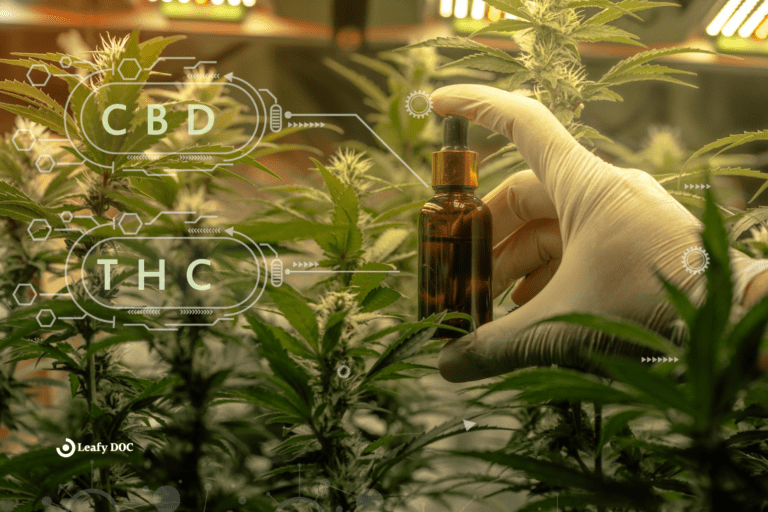Personality Disorders
Can medical cannabis help people with this condition? Find out more below.
What is a Personality Disorder?
A personality disorder is a mental health condition characterized by long-standing patterns of thoughts, feelings, and behaviors that deviate significantly from the expectations of one’s culture, leading to difficulties in relationships, work, and other areas of life.
There are many different types of personality disorders, including borderline personality disorder, narcissistic personality disorder, antisocial personality disorder, and others. Each type of personality disorder has its own specific symptoms and diagnostic criteria.
What causes it?
The exact causes of personality disorders are not fully understood, but they are believed to arise from a complex interplay of genetic, environmental, and social factors. Childhood trauma, abuse, neglect, and dysfunctional family dynamics are often cited as contributing factors.
How common is it?
The prevalence of personality disorders varies depending on the specific type of disorder and the population being studied. According to the National Institute of Mental Health, an estimated 9.1% of adults in the United States have at least one personality disorder. However, the actual prevalence may be higher due to underdiagnosis and lack of access to mental health care.
What are the types of PD?
There are several types of personality disorders, each with unique characteristics and diagnostic criteria. Here are brief descriptions of some of the most common types:
- Borderline Personality Disorder (BPD): Individuals with BPD often struggle with intense emotions, unstable relationships, impulsivity, and self-destructive behavior. They may also experience feelings of emptiness and have a distorted sense of self-identity.
- Narcissistic Personality Disorder (NPD): Individuals with NPD have an inflated sense of self-importance, a lack of empathy, and a need for admiration from others. They may also engage in grandiose fantasies and believe they are entitled to special treatment.
- Antisocial Personality Disorder (ASPD): Individuals with ASPD often disregard the rights and feelings of others, have a lack of remorse or guilt, and tend to engage in impulsive and risky behavior. They may also have a history of legal problems and difficulties maintaining relationships.
- Avoidant Personality Disorder (AVPD): Individuals with AVPD may experience feelings of inadequacy, hypersensitivity to criticism, and a strong desire to avoid social situations. They may also be preoccupied with the possibility of rejection or criticism.
- Obsessive-Compulsive Personality Disorder (OCPD): Individuals with OCPD often preoccupy with orderliness, perfectionism, and control. They may also have difficulty expressing emotions and tend to be inflexible in thinking and behavior.
- Schizotypal Personality Disorder (STPD): Individuals with STPD may exhibit odd beliefs, behaviors, and speech patterns. They may also experience social anxiety, have difficulty forming close relationships, and exhibit eccentric or peculiar behavior.
Signs & Symptoms
The signs and symptoms of personality disorders can vary depending on the specific type of disorder and the individual. However, some common patterns of behavior and thought might be present in individuals with personality disorders. Here are some of the primary signs and symptoms of personality disorders:
- Distorted sense of self: Individuals with personality disorders may have an unstable or unclear self-identity. They may struggle with emptiness or confusion about their identity, leading to difficulty establishing a sense of purpose or direction in life.
- Difficulty with relationships: Personality disorders can make it challenging for individuals to form and maintain healthy relationships. They may struggle with intense emotions, trust issues, and fear of abandonment or rejection.
- Impulsivity: Individuals with personality disorders may engage in impulsive or reckless behavior, such as substance abuse, promiscuity, or gambling. This behavior may be coping with intense emotions or seeking excitement and stimulation.
- Emotional instability: Personality disorders can cause intense and often unpredictable emotional reactions. Individuals may struggle with mood swings, anger, anxiety, and depression.
- Self-harm or suicidal behavior: Some individuals with personality disorders may engage in self-harm or suicidal behavior to cope with emotional distress.
- Lack of empathy: Some personality disorders can cause individuals to struggle with empathy or understanding the perspectives and feelings of others.
Diagnosis & Treatment
Diagnosing and treating personality disorders can be complex, requiring a comprehensive evaluation and a multidisciplinary approach. Here are some common methods used to diagnose and treat personality disorders:
Diagnosis:
- Clinical assessment: A mental health professional, such as a psychiatrist or psychologist, will conduct a thorough clinical assessment to evaluate the individual’s symptoms, medical history, and personal and family background.
- Diagnostic criteria: The mental health professional will use standardized diagnostic criteria, such as the Diagnostic and Statistical Manual of Mental Disorders (DSM-5), to determine whether the individual meets the criteria for a specific personality disorder.
Treatment:
- Psychotherapy: Psychotherapy, or talk therapy, is a common treatment for personality disorders. Different types of therapy may be used, including cognitive-behavioral therapy (CBT), dialectical behavior therapy (DBT), and psychodynamic therapy. Therapy can help individuals learn coping strategies, improve their relationships, and manage their emotions.
- Medication: Medications may be used to treat specific symptoms of personality disorders, such as depression, anxiety, or psychosis. However, medication is not typically used as the primary treatment for personality disorders.
- Support groups: Support groups can provide individuals with a safe and supportive environment to share their experiences and connect with others with similar struggles.
- Hospitalization: In severe cases, hospitalization may be necessary to stabilize the individual’s symptoms and ensure their safety.
Can medical cannabis help?
There is currently limited scientific research on the use of medical cannabis for the treatment of personality disorders, and the potential benefits and risks are not well understood. However, some preliminary research suggests that medical cannabis may have therapeutic potential for some of the symptoms associated with certain personality disorders.
For example, medical cannabis has been found to have anxiolytic (anti-anxiety) and mood-stabilizing properties, which may be helpful for individuals with borderline personality disorder (BPD) who struggle with intense emotions and mood swings. Some studies have also suggested that medical cannabis may have antipsychotic effects, which could be beneficial for individuals with schizotypal personality disorder (STPD).
However, it’s important to note that the effects of medical cannabis can vary depending on the individual and the specific strains and dosages used. Medical cannabis can also have side effects, such as dizziness, fatigue, and impaired coordination, which may be particularly concerning for individuals with personality disorders that involve impulsive or risky behavior. It’s best to discuss an MMJ treatment plan with your healthcare provider.
Last Updated: June 14, 2024
Get Your Medical Card
Connect with a licensed physician online in minutes
Table of Contents
Keep Reading
-
Cannabis And Exercise: Exploring The Effects Of Cannabinoids
Unleash the Power of Cannabis and Exercise: Uncover the Surprising Effects of Cannabinoids on Your Workout Routine. Boost your wellness today – Click to Learn More!
-
THC vs. CBD: Which is Best for Your Medical Condition?
Learn about the difference between THC and CBD and which one is best for your medical condition. Discover the unique properties of each cannabinoid and how they can be used for treatment.
-
Can I Mix Zoloft And Cannabis Products?
Uncover the truth about mixing Zoloft and cannabis products: Is it safe or risky? Get informed and make the right decision for your health. Click here to find out more!



